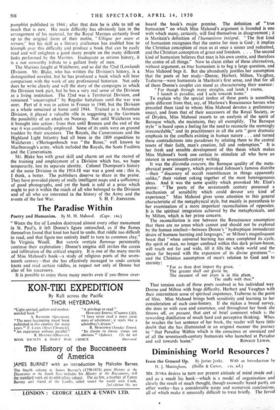The Paradise Within
Poetry and Humanism. By M. M. Mahood. (Cape. 16s.) " WHEN the fire of London destroyed almost every other monument in St. Paul's, it left Qonne's figure untouched, as if the flames themselves found that knot too hard to undo, that riddle too difficult to read, and that figure too entirely itself to turn to common clay." So Virginia Woolf. But veteris vestigia flammtle persistently continue their exploration ; Donne's enigma still invites the caress and infiltration of the critical enquiry. It is one of the many merits of Miss Mahood's book—a study of religious poets of the seven- teenth century—that she has effectively managed to undo certain knots and read certain riddles, in respect not only of Donne but also of his successors.
It is possible to enjoy those many merits even if you throw over-
board the book's major premise. The definition of " true humanism " on which Miss Mahood's argument is founded is one with which many, certainly, will find themselves in disagreement ; it is Maritain's definition of l'humanisme integral. " The first kind of humanism recognises that the centre for man is God ; it implies the Christian conception of man as at once a sinner and redeemed, and the Christian conception of grace and freedom. . . . The second kind of humanism believes that man is his own centre, and therefore the centre of all things." Now to claim either of these alternatives, without argument, as true humanism is to beg a large question, and Miss Mahood begs it. But she abundantly justifies her assumption that the poets of her study—Donne, Herbert, Milton, Vaughan, Traherne—were humanists in Maritain's first sense, and that for all of them Donne's couplet can stand as characterising their essence:
" For though through many streights, and lands I roame, I launch at paradise, and I saile towards home."
To explain why the special timbre of these poets is something quite different from that, say, of Marlowe's Renaissance heroes who preceded them (and to whom Miss Mahood devotes a preliminary essay), and from that of their successors of the Royal Society, or of Dryden, Miss Mahood resorts to an analysis of the spirit of Baroque which, she maintains, they all exemplify. The Baroque style " is based upon a feeling for the need to reconcile the seemingly irreconcilable," and its practitioners in all the arts " gave dramatic emphasis to the conflicts existing in human nature . . . and turned these contradictions into paradoxes by relating them to the central tenets of their faith, man's creation, fall and redemption." It is her fresh and sensible .development of this thesis which makes Miss Mahood's book one certain to stimulate all who have an interest in seventeenth-century writing.
It was the discordia concors, the Baroque quality of the meta- physical poets' imagery, which provoked Johnson's famous diatribe —their " discovery of occult resemblances in things apparently unlike," their violent yoking together of the most heterogeneous ideas. And it was the same quality which provoked Mr. Eliot's praise: " The poets of the seventeenth century possessed a mechanism of sensibility which could devour any kind of experience." Miss Mahood gives some attention to this general characteristic of the metaphysical style, but mainly in parenthesis to her examination of a more important reconciliation of opposites. It is the spiritual integration achieved by the metaphysicals, and by Milton, which is her prime concern.
The reconciliation is one between the Renaissance assumption that there are no areas which cannot and should not be explored by the human intellect—between Donne's " hydroptique immoderate desire of humane learning and languages," or Milton's magniloquent boast that " when universal learning has once completed its -cycle, the spirit of man, no longer confined within this dark prison-house, will reach out far and wide, till it fills the whole world and the space far beyond with the expansion of its divine greatness "- and the Christian assumption of man's relation to God and to
eternity: " For as thou dost impart thy grace,
The greater shall our glorie be. The measure of our joyes is in this place, The stuffe with thee."
That tension each of these poets resolved in his individual way Donne and Milton with huge difficulty, Herbert and Vaughan with their intermittent sense of spiritual impotence, Traherne to the point of bliss. Miss Mahood brings both sensitivity and learning to her consideration of each case-history. If she makes a broad survey, she does so with ease and assurance, and throughout her book she throws off, en passant, that sort of brief comment which is the rewarding distillation of much hard and perceptive thinking. When he reaches the last sentence of her book, the reader will have little doubt that she has illuminated in an original manner- the journey to " that Paradise Within which is the conscious or unvoiced end of all the seventeenth-century humanists who launched at Paradise






































 Previous page
Previous page